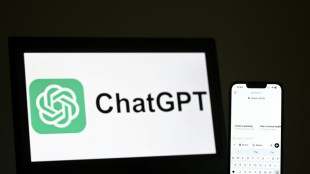
-
 Australian A-League side Western United stripped of licence
Australian A-League side Western United stripped of licence
-
'Back home': family who fled front buried after Kyiv strike

-
 Indonesia cracks down on pirate protest flag
Indonesia cracks down on pirate protest flag
-
Israeli army will 'take control' of Gaza City: PM's office

-
 Australian mushroom murderer accused of poisoning husband
Australian mushroom murderer accused of poisoning husband
-
Coventry's mettle tested by Russian Olympic debate, say former IOC figures

-
 Library user borrows rare Chinese artwork, returns fakes: US officials
Library user borrows rare Chinese artwork, returns fakes: US officials
-
Parisians hot under the collar over A/C in apartments

-
 Crypto group reportedly says it planned sex toy tosses at WNBA games
Crypto group reportedly says it planned sex toy tosses at WNBA games
-
American Shelton tops Khachanov to win first ATP Masters title in Toronto

-
 Tokyo soars on trade deal relief as Asian markets limp into weekend
Tokyo soars on trade deal relief as Asian markets limp into weekend
-
New species teem in Cambodia's threatened karst

-
 Australian mushroom murderer accused of poisoning husband: police
Australian mushroom murderer accused of poisoning husband: police
-
Solid gold, royal missives and Nobel noms: how to win Trump over

-
 Canadian teen Mboko outlasts Osaka to win WTA Montreal crown
Canadian teen Mboko outlasts Osaka to win WTA Montreal crown
-
Trump to host Armenia, Azerbaijan for historic 'Peace Signing'

-
 Israeli airline's Paris offices daubed with red paint, slogans
Israeli airline's Paris offices daubed with red paint, slogans
-
US raises bounty on Venezuela's Maduro to $50 mn

-
 Lebanon cabinet meets again on Hezbollah disarmament
Lebanon cabinet meets again on Hezbollah disarmament
-
France's huge wildfire will burn for days: authorities

-
 Bolivia right-wing presidential hopeful vows 'radical change'
Bolivia right-wing presidential hopeful vows 'radical change'
-
Trump says would meet Putin without Zelensky sit-down

-
 Trump offers data to justify firing of labor stats chief
Trump offers data to justify firing of labor stats chief
-
Bhatia leads by one at PGA St. Jude, Scheffler five adrift

-
 Disney settles Trump-supporting 'Star Wars' actor lawsuit
Disney settles Trump-supporting 'Star Wars' actor lawsuit
-
Trump moves to kill $7 billion in solar panel grants

-
 Venus Williams falls at first hurdle in Cincinnati
Venus Williams falls at first hurdle in Cincinnati
-
Mixed day for global stocks as latest Trump levies take effect

-
 SpaceX agrees to take Italian experiments to Mars
SpaceX agrees to take Italian experiments to Mars
-
US judge orders temporary halt to new 'Alligator Alcatraz' construction

-
 US uses war rhetoric, Superman to recruit for migrant crackdown
US uses war rhetoric, Superman to recruit for migrant crackdown
-
US to rewrite its past national climate reports

-
 U can't pay this: MC Hammer sued over delinquent car loan
U can't pay this: MC Hammer sued over delinquent car loan
-
WHO says nearly 100,000 struck with cholera in Sudan

-
 Huge wildfire in southern France now under control
Huge wildfire in southern France now under control
-
Kane scores as Bayern thump Spurs in pre-season friendly

-
 France strikes down return of banned bee-killing pesticide
France strikes down return of banned bee-killing pesticide
-
Canada sends troops to eastern province as fire damage grows

-
 OpenAI releases ChatGPT-5 as AI race accelerates
OpenAI releases ChatGPT-5 as AI race accelerates
-
Plastic pollution treaty talks deadlocked

-
 A French sailor's personal 'Plastic Odyssey'
A French sailor's personal 'Plastic Odyssey'
-
Netanyahu says Israel to control not govern Gaza

-
 Partey signs for Villarreal while on bail for rape charges
Partey signs for Villarreal while on bail for rape charges
-
Wales have the talent to rise again, says rugby head coach Tandy

-
 US partners seek relief as Trump tariffs upend global trade
US partners seek relief as Trump tariffs upend global trade
-
Five England players nominated for women's Ballon d'Or

-
 PSG dominate list of men's Ballon D'Or nominees
PSG dominate list of men's Ballon D'Or nominees
-
Americans eating (slightly) less ultra-processed food

-
 Man Utd agree 85m euro deal to sign Sesko: reports
Man Utd agree 85m euro deal to sign Sesko: reports
-
France to rule on controversial bee-killing pesticide bill

| RBGPF | -5.79% | 71.84 | $ | |
| RYCEF | -0.42% | 14.44 | $ | |
| BTI | 0.51% | 56.69 | $ | |
| CMSC | 0.04% | 22.96 | $ | |
| CMSD | -0.09% | 23.52 | $ | |
| BCC | 0.32% | 83.19 | $ | |
| RIO | 1.12% | 60.77 | $ | |
| SCS | 0.06% | 16 | $ | |
| NGG | -0.31% | 72.08 | $ | |
| SCU | 0% | 12.72 | $ | |
| RELX | 1.03% | 49.32 | $ | |
| VOD | -0.36% | 11.26 | $ | |
| JRI | 0.52% | 13.41 | $ | |
| BP | 0.91% | 34.19 | $ | |
| GSK | 2.21% | 37.58 | $ | |
| BCE | 2.23% | 23.78 | $ | |
| AZN | 1.3% | 74.57 | $ |

Inner workings of AI an enigma - even to its creators
Even the greatest human minds building generative artificial intelligence that is poised to change the world admit they do not comprehend how digital minds think.
"People outside the field are often surprised and alarmed to learn that we do not understand how our own AI creations work," Anthropic co-founder Dario Amodei wrote in an essay posted online in April.
"This lack of understanding is essentially unprecedented in the history of technology."
Unlike traditional software programs that follow pre-ordained paths of logic dictated by programmers, generative AI (gen AI) models are trained to find their own way to success once prompted.
In a recent podcast Chris Olah, who was part of ChatGPT-maker OpenAI before joining Anthropic, described gen AI as "scaffolding" on which circuits grow.
Olah is considered an authority in so-called mechanistic interpretability, a method of reverse engineering AI models to figure out how they work.
This science, born about a decade ago, seeks to determine exactly how AI gets from a query to an answer.
"Grasping the entirety of a large language model is an incredibly ambitious task," said Neel Nanda, a senior research scientist at the Google DeepMind AI lab.
It was "somewhat analogous to trying to fully understand the human brain," Nanda added to AFP, noting neuroscientists have yet to succeed on that front.
Delving into digital minds to understand their inner workings has gone from a little-known field just a few years ago to being a hot area of academic study.
"Students are very much attracted to it because they perceive the impact that it can have," said Boston University computer science professor Mark Crovella.
The area of study is also gaining traction due to its potential to make gen AI even more powerful, and because peering into digital brains can be intellectually exciting, the professor added.
- Keeping AI honest -
Mechanistic interpretability involves studying not just results served up by gen AI but scrutinizing calculations performed while the technology mulls queries, according to Crovella.
"You could look into the model...observe the computations that are being performed and try to understand those," the professor explained.
Startup Goodfire uses AI software capable of representing data in the form of reasoning steps to better understand gen AI processing and correct errors.
The tool is also intended to prevent gen AI models from being used maliciously or from deciding on their own to deceive humans about what they are up to.
"It does feel like a race against time to get there before we implement extremely intelligent AI models into the world with no understanding of how they work," said Goodfire chief executive Eric Ho.
In his essay, Amodei said recent progress has made him optimistic that the key to fully deciphering AI will be found within two years.
"I agree that by 2027, we could have interpretability that reliably detects model biases and harmful intentions," said Auburn University associate professor Anh Nguyen.
According to Boston University's Crovella, researchers can already access representations of every digital neuron in AI brains.
"Unlike the human brain, we actually have the equivalent of every neuron instrumented inside these models", the academic said. "Everything that happens inside the model is fully known to us. It's a question of discovering the right way to interrogate that."
Harnessing the inner workings of gen AI minds could clear the way for its adoption in areas where tiny errors can have dramatic consequences, like national security, Amodei said.
For Nanda, better understanding what gen AI is doing could also catapult human discoveries, much like DeepMind's chess-playing AI, AlphaZero, revealed entirely new chess moves that none of the grand masters had ever thought about.
Properly understood, a gen AI model with a stamp of reliability would grab competitive advantage in the market.
Such a breakthrough by a US company would also be a win for the nation in its technology rivalry with China.
"Powerful AI will shape humanity's destiny," Amodei wrote.
"We deserve to understand our own creations before they radically transform our economy, our lives, and our future."
R.AbuNasser--SF-PST
